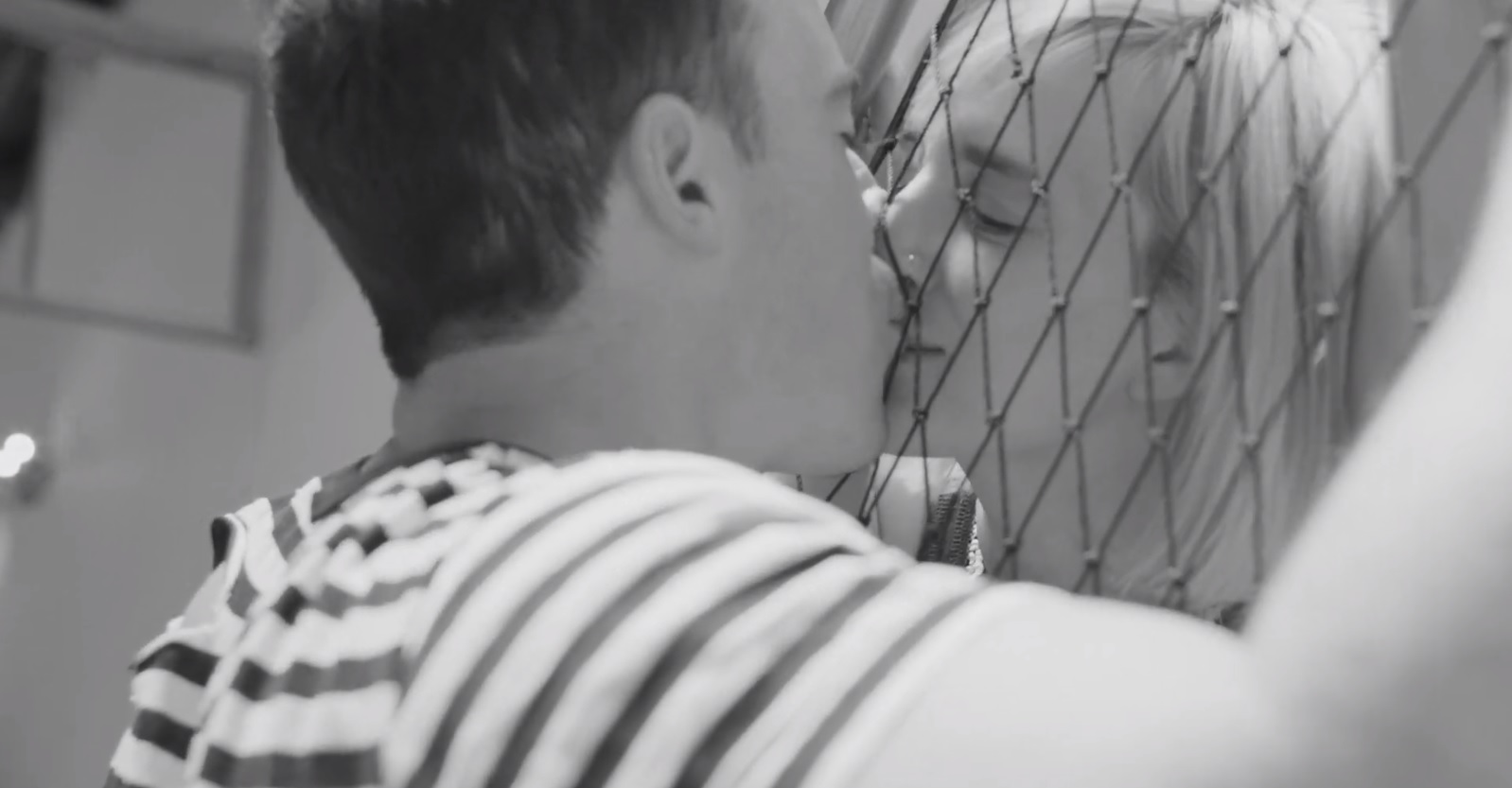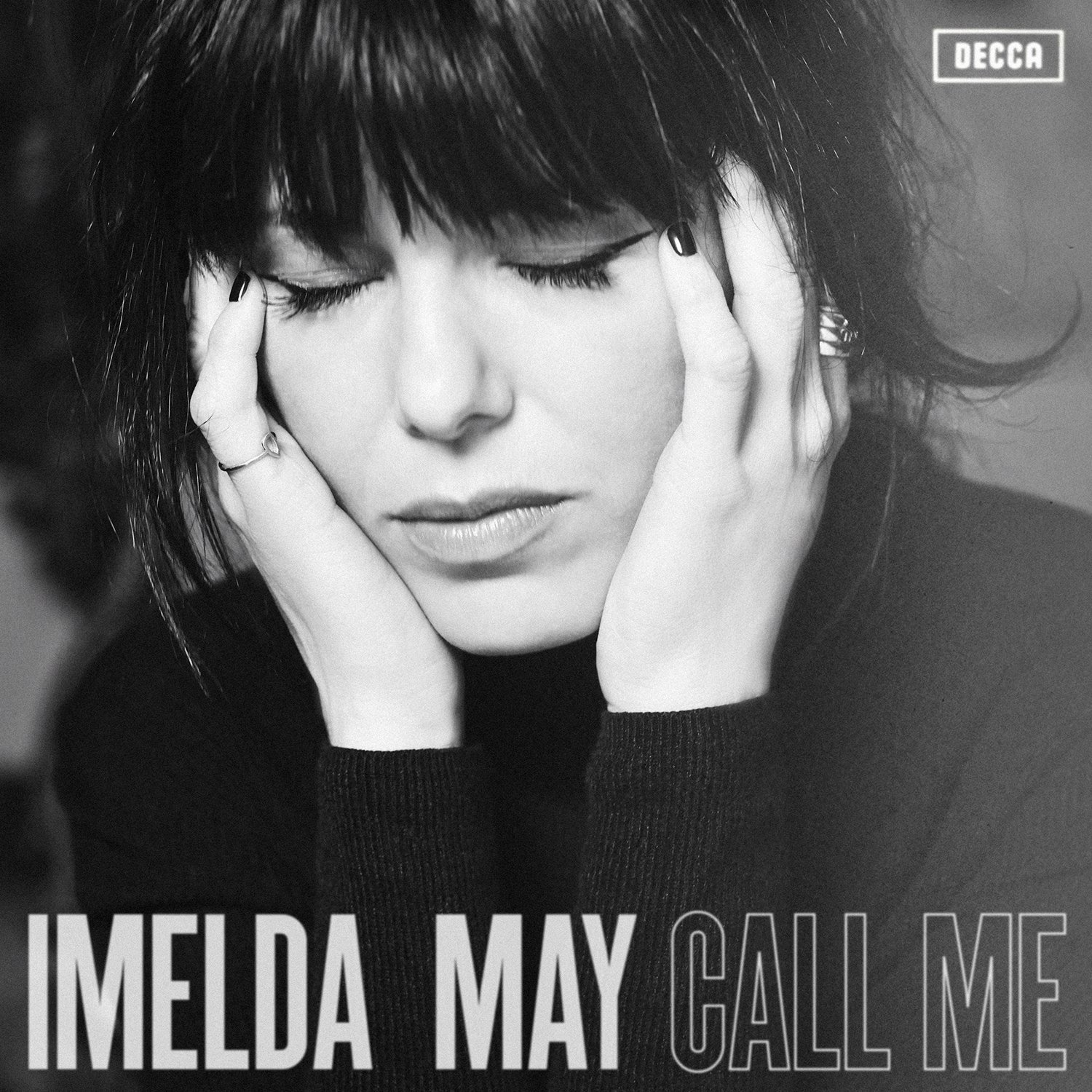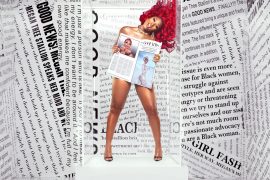Caroline Polachek once again collaborates with producer Danny Harle to craft an environment that is seductive as it is unsettling on ‘Desire, I Want to Turn into You,’ the follow-up to 2019’s ‘Pang.’
‘Desire, I Want to Turn into You’ – Caroline Polachek
Sometimes I wonder, do I love you too much? Then I tell myself — Caroline, shut up.
And it is, of course, the way she, the Caroline in question, says her name within the song—breaking it up into thirds, singing it with a kind of writhing, sensual emphasis as each syllable deliberately tumbles into the pulsating bed of music waiting below.
“Car – o – line,” she sings. “Shut up.”
And I find I am, as I so often catch myself doing, thinking again about the relationship I have with time and place, and how that regularly relates to a specific artist or a particular album.
Released in October of 2019, which for me, and perhaps for you as well, feels like a lifetime ago for myriad reasons, I was admittedly a few minutes late to the party on Caroline Polachek’s Pang — the first full-length album she’d issued under her own name, following the trio of albums she had recorded in the late 2000s and early 2010s with the outfit Chairlift, and the two other albums she’d released on her own, though under different monikers — Ramona Lisa, and CEP, respectively.
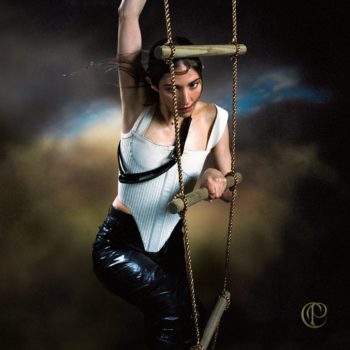
And four years is now far enough in the past that I am unable to remember the details as to why I was late in the first place; was it an album, and was Polachek an artist that, at that point in time, neither, for whatever reasons, were on my radar, nor were registering for me to take note of when I would see headlines mentioning them?
Or was I, as perhaps you might have been, even, uncertain of or slightly off-put by the album’s bizarre cover art — Polachek, dangling from a rope ladder, dressed like an action hero, with little, if any, explanation as to the reason behind the aesthetic.
The rest of the art direction for the album, and the costumes she wore in the photographs found in the liner notes that I would later discover once I received a copy of Pang on LP, were even stranger, and possibly more unsettling at first glance.
And it would have been near the end of 2019, or the very beginning of 2020, when I began to move beyond however I might have felt at the time about Pang’s sleeve art, and was able to be a little more forgiving toward the self-aware sense of humor in both the title of as well as within the arranging of the whimsical single, “So Hot You’re Hurting My Feelings,” and in finally sitting down with album, I came to appreciate it as a whole, yes, sure—but I came to appreciate and genuinely adore a small handful of songs specifically—the somber and reflective “Look at Me Now,” the swirling, swooning “Door,” and the smirking, smoldering “Caroline Shut Up.”
A small handful of songs that found their way into the rotation of music I would listen to on my morning walk to work — fifteen minutes from point A to point B, often before the sun was truly rising, and in the dead of winter, a trek often punctuated by the kind of cold that seeps through your skin, into your bones, that you are unable to shake throughout the day.
I find I am, as I so often catch myself doing, thinking again about the relationship I have with time and place, and how that relates to a specific artist, or a particular album.
Or a small handful of songs.
The first two months of 2020 are almost a foreign concept to think about now — there is the literal distance, yes, between where we are now, or who we are now, and where and who we were three years ago, but there is also the figurative distance from the world as it was, and the way the world began to shift as February turned into March and nothing was the same.
I think about those walks to work in the morning, often beginning them when the sky was still dark, with the sun just beginning to peak over the horizon as I neared the final few moments of the journey. I think about the more or less certainty of my workday as 2019 became 2020 — a kind of routine to the day itself and a climate within the workplace itself that I would quickly realize I had been taking for granted for years, and how as February turned into March, every morning, through the cold, as the sun began to rise, I was walking into more and more uncertainty and unease.
I find I am, as I so often catch myself doing, thinking again about the relationship I have with time and place, and how that relates to a specific artist, or a particular album, and how at the beginning of 2020, I listened to a small handful of songs by Caroline Polachek because I genuinely liked them — two out of the three being emotionally manipulative enough that I often questioned why I was, in fact, playing them so early in the day, before I had arrived at work.
I find I am, as I so often catch myself doing, thinking again about the relationship I have with time and place and how as February turned into March, I continued turning to these songs, and Pang, as a whole, throughout the early months of uncertainty and unease, simply because there was, even in how emotionally manipulative they were and how emotional they could make me feel if they caught me at the right time, something comforting about them—a reminder, of sorts, of one of the last few things I had made an emotional connection with before everything changed.
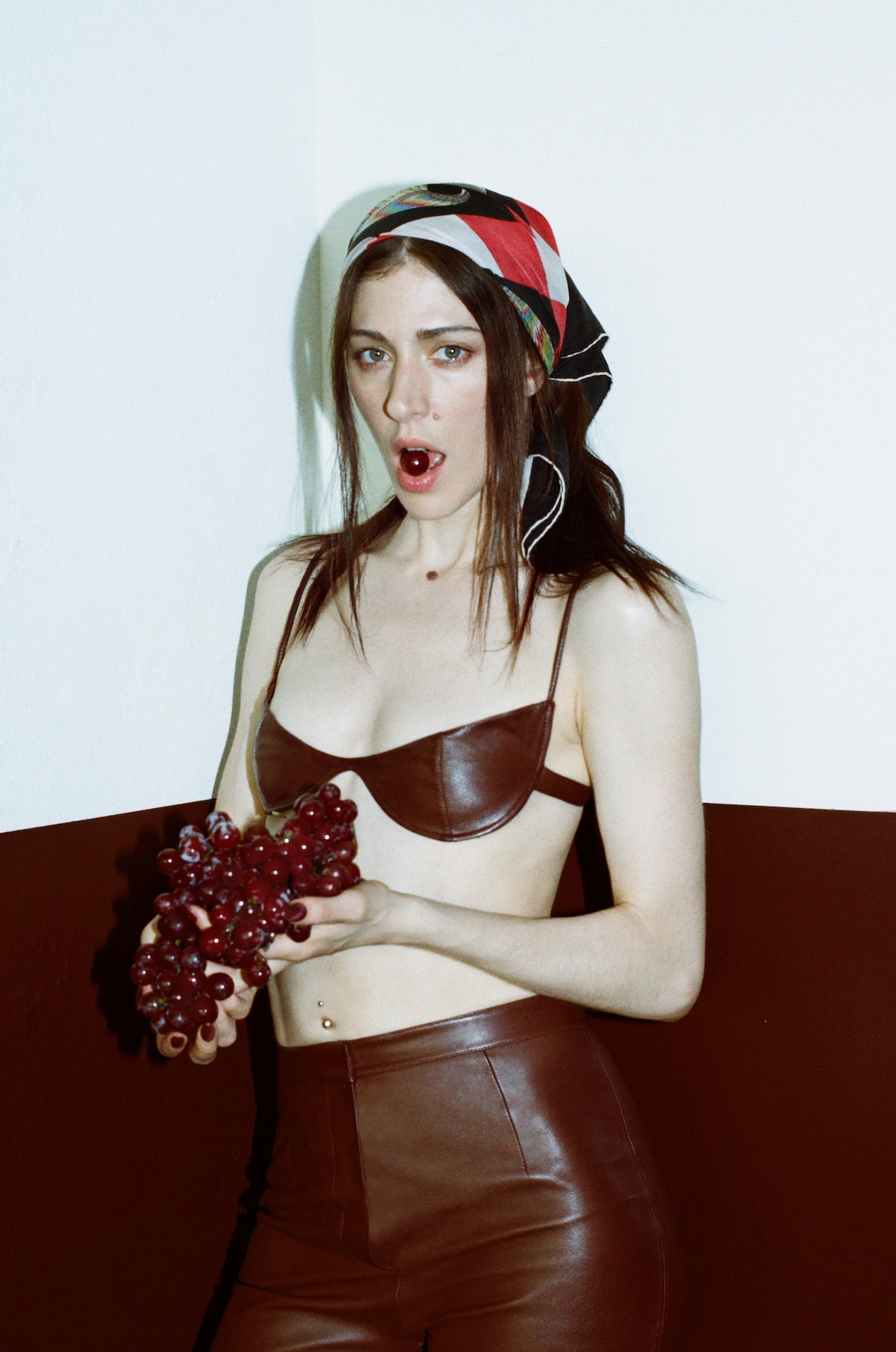
Sometimes I wonder, do I love you too much? Then I tell myself — Caroline, shut up.
And I have, to the extent I am able, at least in recent years, learned how to enjoy, or appreciate, music that doesn’t always necessarily take itself seriously. I have come to understand that music doesn’t always need to take itself so seriously and that, in certain situations, it is okay to have a sense of humor within a song.
I understand, though I often need a reminder, that music — pop music, specifically, often just wants to have fun, and those lyrics do not always need to be overanalyzed, and arrangements do not need to be broken down layer by layer.
Sometimes music — pop music, specifically, is just about the vibe the artist wants to cultivate and share with the audience.
And this — specifically the sense of humor — had been a barrier for me in the past, preventing me from listening, or even being genuinely interested, in particular songs or artists, or specific corners of a genre based on their perceived sense of humor and my apparent lack thereof. What I am uncertain of, though, is if there was a specific moment — a song, or artist, that was the impetus for this slow understanding and acceptance, and this shift in my level of tolerance and appreciation.
Admittedly, this understanding, acceptance, and appreciation are all things I am still working through regularly, taking it all on a song-by-song, and artist-by-artist basis.
Polachek, on Pang, did not break the fourth wall often — the invisible boundary between herself, the world she’s built for herself within the album, and the listener, but the further along into the album she guides you, the more comfortable she seemingly became with writing in small, self-aware, and perhaps a little self-effacing, winks at the listener.
The title alone, “So Hot You’re Hurting My Feelings,” is one of those moments — the song itself, delivered in earnest, while somehow also leaning heavily into a surprising campiness; “Caroline Shut Up,” is the other instance—a slow-burning, perhaps indirect homage to a hazy kind of girl group sound from pop music’s distant past, and it is startling, at first, the way Polachek is self-aware and self-referential within the song’s chorus.
“Sometimes I wonder,” she asks. “Do I love you too much? Then I tell myself — Car – o – line, shut up.”
And in the hands of a much less capable singer, or artist, I don’t believe this would land as well as it does here. But Polachek is so confident, and fully committed to herself as an artist—arguably seeing herself as an “Artist With A Capital A,” that it works.
It works well enough that, after the initial surprise, you don’t even bat an eyelash at hearing her sing her own name over, and over again in the song. In fact, it’s such a good song, and so well executed, she’s got you singing right alongside her.
Bunny is a rider — satellite can’t find her.
And I had a moment where I was uncertain if this, in fact, had actually occurred or if I was misremembering — but it did, in fact, happen. Released in the nebulous space of it being either a small glimmer into the shape of things to (eventually) come, or simply just a one-off (at the time, there was no clear answer as to which we were supposed to understand it to be), Pitchfork did, in fact, name Polachek’s 2021 jittery single, “Bunny Is A Rider” as their number one song of that year.
And if I am being honest, two years ago, I was surprised by the choice and a little uncertain as to why they had made it; and now, two years later, even with the song framed a little more through the context of its inclusion within Polachek’s new album — Desire, I Want To Turn into You, her fourth solo album overall and the second released under her own name — and even with the additional singles very slowly revealed in advance of the album’s eventual arrival, Pitchfork’s decision is still a surprising choice, and one I am still uncertain about.
“Bunny Is A Rider” is not a bad song, but was it the “best” from an entire calendar year of music? And if so, what it about it makes it that impressive?
I am simply unable to hear it.
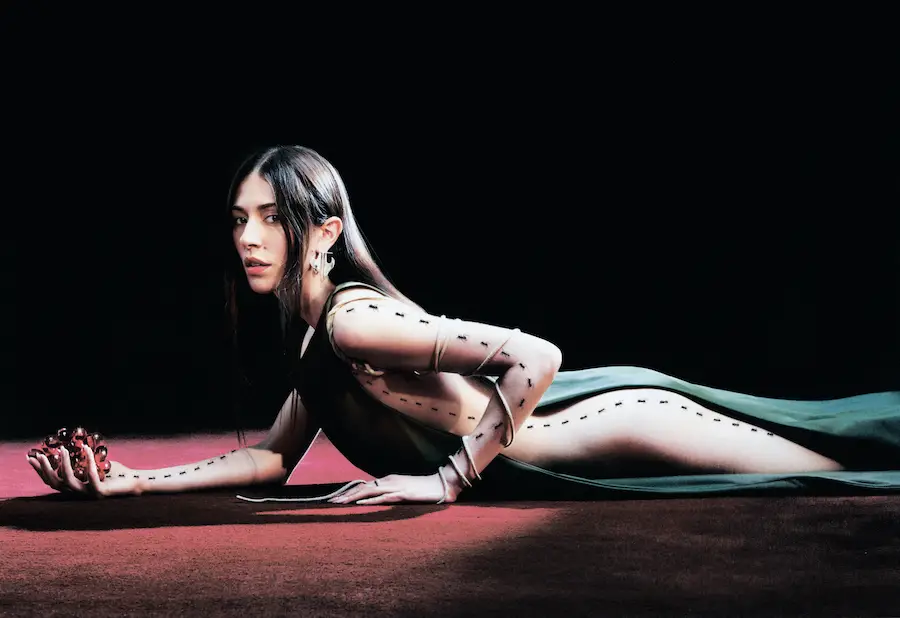
From what I can remember, around the time of its release in the summer of 2021, I was surprisingly nonplussed by it — surprising, given how much time I had spent immersed in Pang just the year prior, and how much some of its songs had come to mean to me, and how often I still ruminated on them.
Surprising because I had, perhaps, set too high of expectations for a new single from Polachek — or what I wanted from a new single, rather than what she was willing to give.
“Bunny Is A Rider” is not a bad song — as strange as it is infectious, but not bad. Though, what I think kept me at a distance with it, and is still keeping me at a distance, is that it is not as immediate, or urgent — emotionally speaking, specifically, but even to some extent, musically as well, as perhaps some of the material on Pang was for me.
And retrospectively, perhaps I needed the world of a record to immerse myself in, in order to work toward any kind of better appreciation of “Bunny Is A Rider” — but on its own, it just did not resonate.
In saying that, I do not feel like it is not as immediate, or urgent, for me as the listener, I also need to point out that I am able to understand that with the way the song quickly, and dizzyingly unfolds itself — “Sunset,” another early single from Desire, feels similarly — is that there is an emergent intention within.
Regardless, though, of the enthusiasm or exuberance intended by Polachek, I feel like the connection she wants to make isn’t there, or if it is, it is not as strong as she believes it to be.
Bunny is a rider. Giddy up — can’t find her.
Who is the titular Bunny — it is, perhaps, a question that I did not ask myself at the time of the single’s release—maybe considering it once, in passing, out of curiosity when seeing the song’s title, but why would I have had the need to ponder it more?
With the song’s inclusion as part of Desire, I Want To Turn Into You, it is a question that I began asking myself again — partially in jest, and as it turns out, per a quote from an interview between Polachek and Charlie XCX, the titular “Bunny” is all of us.
“Anyone can be bunny if you make yourself a bit unavailable,” she explained.
“If you’re not really giving that text back, if you are booked and busy, if you are feeling yourself and you have big plans,” Polachek continued, “(the song) is about being unavailable and being kind of ephemeral and being on your own schedule… I thought the idea of being free and sexy in the summer was actually just like no strings attached….”
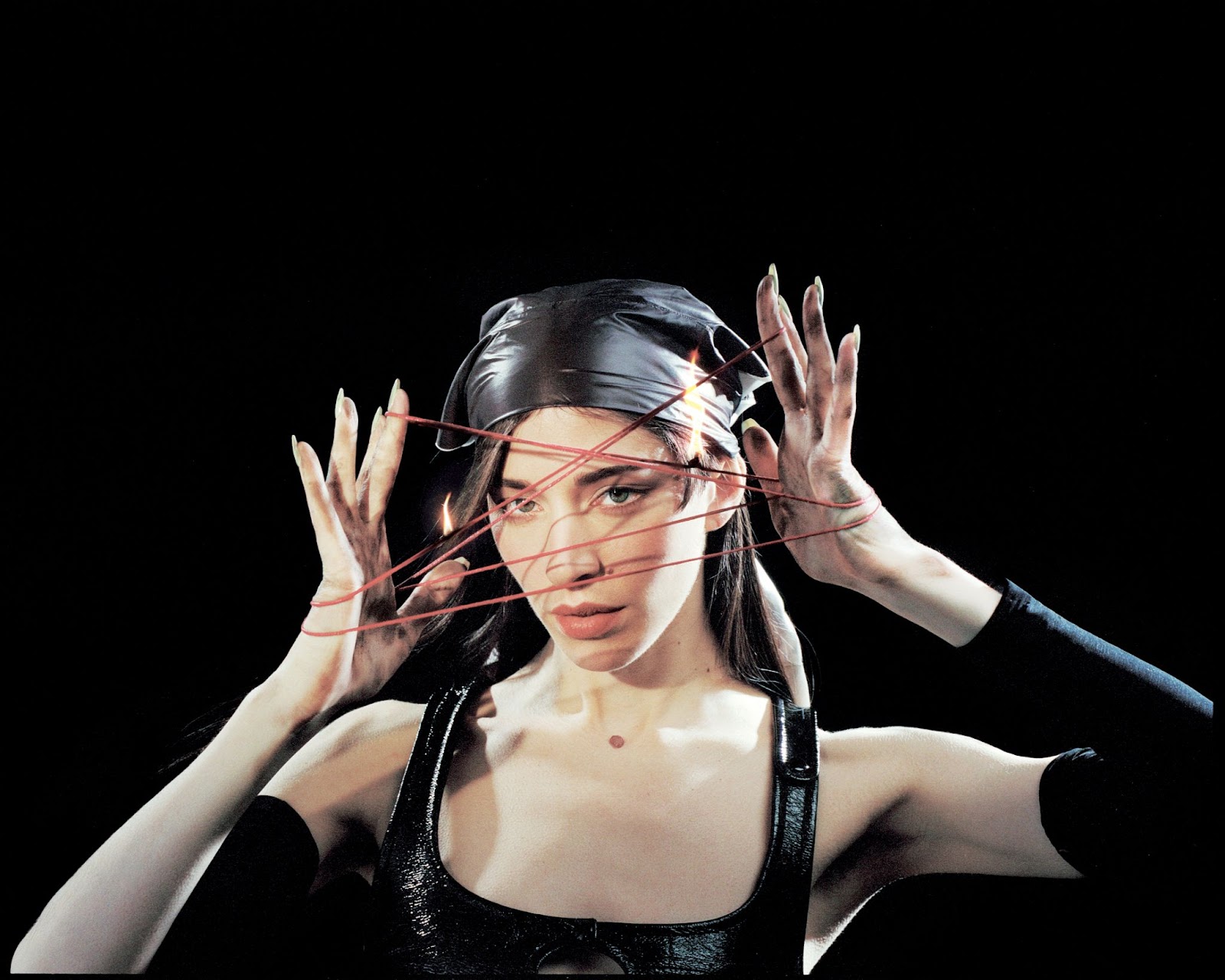
And there have been times within the last three years and change when, while listening to Polachek, that I have needed to remind myself that she was born in the United States — a reminder that, perhaps, you may feel is unnecessary or a little strange for me to find the need to do, but I require it for a number of reasons.
I realize that using the genre “World Music” is condescending and dismissive, and that describing something or someone as being “exotic” is problematic, but throughout Polachek’s canon, especially within the songs released ahead of Desire’s arrival in full. —and even within the deeper portions of the album itself at times, there is often an international flare, and to her as well — at least her persona as an Artist.
There is an alluring otherworldliness and aloofness — how comfortable she is in seemingly uncomfortable outfits, or just how striking her appearance is alone, and there is this kind of carefree, breezy attitude, for example, that one might not associate with someone who was born and raised in Connecticut, but someplace else.
Like somewhere sheik and extraordinarily artistic in Europe.
Or, at times, like another galaxy or dimension.
Anyone can be Bunny, Polachek assures — a relaxed kind of mindset that simply does not register at all with me, based on the fact that I am simply unable to give myself the grace to relax in the slightest bit (You think I’m joking? Just ask my therapist about this), and the conceit of the song overall lacks the emotional weight she’s capable of pouring into a song.
But, perhaps, not everything has to be so heavy.
Sometimes, I need to be reminded that pop music is often about having fun.
There is a vagueness to the lyrics in “Bunny,” but that noncommittal attitude Polachek details is very easy to identify — “I’m so non-physical,” she coos in the song’s chorus, the commanding, in the last line, “Don’t drop my name.” These attributes are present in the song’s arrangements as well.
Co-produced by Danny Harle, who was involved in a number of songs on Pang, I hesitate to refer to its structure as being “sparse,” but there are not nearly as many layers piled on top of one another as there are in other Polachek tunes.
Built around a pulsating, thick bassline, and an eerie whistle that seems like it is coming from deep within a jungle, Harle and Polachek exercise restraint with the amount of other elements they are willing to include, save for the slightly elevated level they take things to within the song’s dazzling chorus—the synthesizer tones that coast throughout are minimal, or at least understated, coupled with the taut percussive elements, creates something that skitters and slithers.
Musically, it is fitting that another one of the early singles from Desire is sequenced immediately after “Bunny,” because of the similarities in aesthetic — the blisteringly paced “Sunset” clips along with even more of an internationally inspired flare.
Structured around a Flamenco-style, strummed acoustic guitar and a relentless rhythm coming from a pulsating synthesizer progression and percussive elements like hand claps—the kind of rhythm that would lend itself well to the heel stomping found in Folklorico dancing, “Sunset” is among the stronger, if not more compelling, and certainly dizzying, of the songs that arrived well ahead of the album in full, specifically when her voice quickly rises and falls in quite astonishing and utterly gorgeous ways during the chorus: “So no regrets — ‘cause you’re my sunset,” Polachek attests with conviction. “Fiery red, forever fearless, and in your arms a warm horizon. Don’t look back — let’s ride away.”
Welcome to my island.
The first thing that Polachek does on Desire is greet us as we, the listeners, have arrived at a specific, though undisclosed, location.
That, perhaps, is not true — it is not the first thing that she does on the album’s strange, shimmering, and audacious opening track, “Welcome to My Island.” The first thing she does, as the song begins, and quickly builds, is let out a series of otherworldly, wordless vocal runs, growing more feral and intense with each one, while also being self-referential, by including a sample of her voice echoing a “Hey,” lifted from the tender ballad “Look at Me Now,” from Pang.
For just slightly over 20 seconds, Polachek and producers James Stack, Harle, and Dan Nigro (who worked with Polachek on Pang and made himself a household name through his work with Olivia Rodrigo on Sour in 2021) tap into a dazzling, ’80s-inspired kind of pure pop perfection that they continue to jump cut away abruptly with an antiquated, kind of stiff synthesizer sound during the verses of the song, before pushing “Welcome” back into a place of enormity and triumph on the chorus, where Polachek belts out the album’s titular phrase — not a request, or an ask, but a demand. “Desire,” she exclaims. “I want to turn into you.”
Polachek described the song as being “bratty,” which, to an extent, I can see in both the kind of restlessness it has within its arranging and structure, as well as the coyness within her lyrics: “Welcome to my island,” she sings with a kind of uneasy, robotic cadence. “Hope you like me — you ain’t leavin’.”
And there is, often, even in moments when a song can be seen as borderline minimalistic, a lot going on within a Caroline Polachek track — “Welcome to My Island” is no different, with the song being pulled in seemingly three different directions at once, between the robotic delivery of her vocals in the verses, the voluminous, dazzling heights the chorus soars to, and then the spoken, almost rapped, extended bridge that arrives near the song’s conclusion—it isn’t out of place. No. Not exactly, but with her lyrics delivered with a breathless kind of urgency, the execution doesn’t exactly work, or at least doesn’t exactly land the way Polachek might want it to, or believe that it does.
Though here, as the song continues to push and pull itself in different directions, is more or less setting a tone for the album as a whole, and is perhaps lacking the emotional weight that she is capable of putting into a song when she wants to (and that I, as a listener, would prefer to hear), I have to remind myself that not everything needs to be so heavy all of the time.
I have to remind myself that pop music is often about having fun.
Welcome to her island.
We’re not leaving. Not yet.

With the album’s final track sequencing revealed at the beginning of February, and one last advance single issued, the inherently more relaxed, sensually swooning “Blood and Butter,” it is not surprising that Polachek, within all of the time leading up to the arrival of Desire, I Want to Turn Into You, would opt to share many of the more chaotic and frenetically arranged tracks ahead of time, saving the often more emotionally evocative, compelling, and complex songs to be experienced within the context of the album in full.
It is within these songs, many of them placed within the middle of the record, where Polachek and Desire truly thrive — or, at the very least, it is within this space where she creates something both intelligent and intricate that lingers well after the album is over.
The word I found myself writing down to describe my experience with Desire the further I waded out into it, and, perhaps, it is the word you might use as well with the album, or Polachek’s output and effect as a whole, is “hypnotic,” because regardless of how successful (or at times a little less successful) she ultimately is in a song’s execution, there is something about her, and this collection, that is extraordinarily powerful in the command she, and it, holds over the listener—sometimes it is an infectious melody or fun, shimmering shout-a-long chorus, but there are moments when it is because of something more subtle, like the lush and expansive production values, or feeling that comes from Polachek’s ability to be both alluring and ethereal in the same breath.
If Polachek, on the rollicking opening track, grabbed your attention, or startled you in some way with its restless bombast, she maintains that grip — softening it slightly, however, with the seductive cadence of “Pretty in Possible.” Beginning with a short introduction where she indulges in some wordless singing (a comparison to “Tom’s Diner” by Suzanne Vega has already been made elsewhere) before a clattering, tightly wound beat drops — Harle, again, is responsible for the production on “Pretty,” and continues to quietly introduce additional layers of texture and instrumentation into the arranging, specifically a low, rumbling synthesizer progression that doubles as the song’s bass line, and an airy melody that comfortably shifts around the clattering percussive elements and Polachek’s vocals.
“Pretty in Possible” is not exactly an antithesis to “Welcome to My Island,” but it is a stark juxtaposition in the extremes Polachek is able to pull herself, her music, and this album — and it is a line of contrasts she walks throughout the rest of Desire — with a bulk of the advance singles serving as the more bombastic or brightly colored moments, and with a majority of the other tracks pulling the album further and further inward toward a place of contemplation.
I am often remiss, as both a listener of music for both analytical purposes, as well as for leisure, to refer to something as a “headphone record” — and with something that can be as dazzling and voluminous as Desire is capable of becoming, it seems like a strange descriptor, simply because this is the kind of record that, at times, begs to be played loudly in the car, or over your home stereo. However, both in its quietest or most meditative and tense moments, as well as in places where it ripples and quivers with dance-floor ready, anthemic exuberance, like the skittering, slinky “I Believe,” there is something about the meticulousness to the production of the record that doesn’t need to be heard through headphones to be truly enjoyed, but it is worth hearing that closely simply to appreciate the attention to detail paid — in a song like “I Believe,” specifically, the way the bass effortlessly courses through, rumbling with intention underneath the jittery rhythm that cascades above.
The furthest inward that Polachek pulls Desire, I Want to Turn Into You, is well within the second half of the record — the exercise in creeping, eerie tension of “Hopedrunk Everasking,” and the primarily acoustic and almost psychedelic leanings of “Butterfly Net,” with the former finding Polachek singing closely and intensely, with little if any effects trailing off of her voice, while icy marimba tones ring out subtly, and a low rush of synthesizers swell, but never to a point where it feels like she is going to lose the tight grip of restraint she has over the song; and on the latter, she guides us into the slow motion, stumbling haze of long, warm, ’70s inspired organ drones and a woozily strummed acoustic guitar.
As Desire begins to wind itself down toward what is a final exhale out into the night, Polachek, on “Smoke,” the penultimate track, leads us out into the darkness of the dance floor one more time—and like “I Believe,” the song surges with enormous sounding synthesizers and the kind of writhing propulsion woven within painting it as a last anthemic gasp. And while it beckons you, one more time, to flail and become lost in the atmosphere Polachek and her collaborators have created, “Smoke,” impressively, walks one more line between extremes that had not yet been explored in the course of the album — the space between sounding absolutely triumphant, and feeling terribly sorrowful.
It’s a strange line to walk, but it is one that Polachek does with grace — and it’s a subtle line that you, perhaps, might not even have noticed, because it has to do with a specific moment within “Smoke,” and the kind of feeling it evokes while it courses through you. It’s tough to describe, though, so you will have to humor me as I try, beginning at roughly the 1:10 mark, within the way Polachek lets her voice rise into a higher register, creating just a small amount of dissonance as it rubs against the stacks of synthesizers swirling around in the foundation of the song — bringing it back down, and then up again, in the vocal melody that has just the slightest hint of melancholy, or regret in it while she howls, “And you are the big answer tonight. And you are melting everything about me — oh, don’t worry about me. It’s just smoke,” before the song, in whatever dissonance, triumph, or sorrow resolve themselves temporarily before she pulls everything back in, and down once again.
It’s a strange line to walk — one that not many artists do, or do well when they try, but it is a juxtaposition that I have, as of late, become fascinated with. The feeling of being to pulled out onto the dance floor, and being uncertain of whether or not you, in wanting to “let it all go,” if you should cry, flail around wildly, or find a way to do both — “Smoke,” in all of its brief, glitchy, pulsating beauty, encourages you to find a way to do both, feeling the triumph and the sorrow, however, you are able.
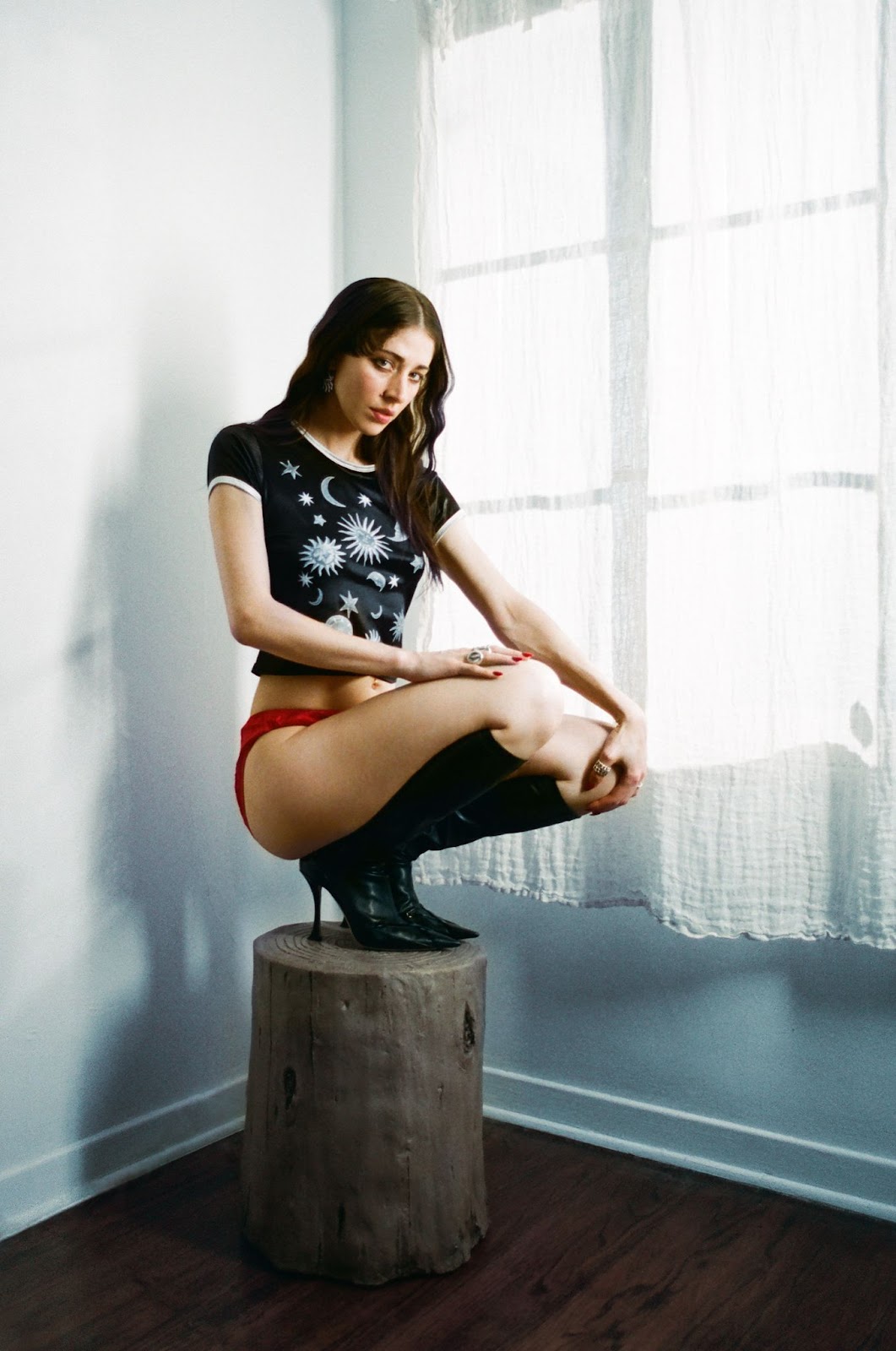
And there is, still, four years after the release of Pang, and with the arrival of Desire, I Want to Turn Into You, something that is both alluring and unsettling about Caroline Polachek as an Artist with a Capital A.
Just when you think you might be put slightly more at ease by her and her music, she does something to disrupt that to make you, perhaps temporarily, just a little uncomfortable.
And this moment where Polachek can make you uncomfortable, or slightly uneasy, doesn’t have to be direct — no, and for direct as Desire, I Want to Turn Into You is, one of the more surprising elements to it as a whole is just how subtle and clever it can be when it wants, and like the subtle juxtaposition of sorrow and triumph found near the conclusion in “Smoke,” there is a slow, creeping sense of tension and unease around the halfway point of the record on “Crude Drawing of an Angel.”
Polachek is, at least in my assessment, less of a lyricist and more about creating a complete picture, or vibe, with a song — the lyricism, regardless of whether it is meant to be taken seriously or if it is a song written with a sense of humor, can often take a backseat at the expense of the song as a whole. “Crude Drawing” is a moment on the album where Polachek is writing from a place that is quite surprisingly both direct, or at least easy to understand in a literal sense, but within the sense of loss and longing, there is an abstraction to the writing as well — where she reveals, cloaked in enough metaphor, just enough to follow along, but never gives away too much in terms of the who, or the where, or why there is, perhaps, such a sense of loss and longing here.
“Crude Drawing” does, as the title implies, depict Polachek (presumably) attempting to draw a portrait of a lover — “Draw the blinds, draw the bath,” she begins as the reserved, pulsating rhythm shudders around her. “It’s a matter of time till you wake up and watch me draw your brow with shaky hand — so that after you’re gone, I got something to hold onto.”
And it is, perhaps, in the way she portrays drawing someone while they sleep that begins this sense of unease, but it is within a specific segment of the song that leads into the chorus, where this creeping, bizarre feeling overtakes the song completely.
Howling, slowly and deliberately, in an extraordinarily high register, “Oh, my fault; oh, my greed; oh, your need,” with her vocals themselves muffled and pushed further down into the song’s mix, what becomes the focus in this part of “Crude Drawing” are the commands, spoken slowly in a disembodied voice — “Red light. Camera one, camera two. On your side, on the carpet. Camera one, camera two.” And there is something about this moment — strange, mysterious, unexplained — an alluring feeling of being watched, and perhaps being completely fine with it, that gives the song a feeling like it is being performed somewhere in a lonely, dystopian future.
Trip hop lite.
Released a full calendar year prior to its position as the closing track on Desire, “Billions” was, much like “Bunny Is A Rider,” a song that I was more nonplussed by than I was anticipating. And it, like “Bunny,” is not a bad song, and the more time I have spent with it, and with the album now as a whole, rather than these loose fragments ahead of time, I still do find it both a fitting, or appropriate final track, as well as a puzzling one.
The truth is, though, on Pang, “Parachute” is a rather unceremonious, albeit theatrical, closing track — unceremonious in the sense that it is a bit of a comedown following the sensual, somber, and dazzling heights of its penultimate moment, “Door.” Comparatively, “Billions” has a lot more energy, though it is still a quiet, restrained way to conclude such a rollicking collection of songs.
Polachek, as an Artist with A Capital A, does regularly sound like she is creating music, and has the enthusiasm and aesthetic of someone who is broadcasting from the future — or, if not the future, another planet, or galaxy. There is an otherworldliness to her, which is what makes her alluring and unsettling. But even with this sound that is ahead of itself in some respects, there are elements of contemporary popular music’s past that can be found on Desire — the inclusion of early ’90s “electronica” rhythms and percussion — drum and bass adjacent, in a number of places was a pleasant surprise, and in finally sitting down with Desire, and spending time with it as a whole — even the songs that I was perhaps a little less impressed by at first and still might be now, I noted the nod to trip-hop, or “trip hop lite” as I wrote down mere seconds after “Billions” began, that was reminiscent of mid-period Massive Attack.
Desire, I Want to Turn Into You is not an album that asks questions of its listeners — not really.
It does challenge them with its perpetual motion through extreme highs and lows, but perhaps the question that album so much does not ask on its own accord, but that I, as a listener, ask of it, is the question of the titular desire.
And there are two ways one could think about the expression “Desire, I Want to Turn Into You,” if one were to give it consideration — the first is, perhaps, the most apparent: that Polachek wants to, figuratively, of course, turn into desire — to become the emotion, or feeling of want; the other, perhaps less apparent, is that Polachek wants to, again, figuratively of course, turn toward desire — turning inward toward it, and being enveloped by it in a sense.
And I can roll my eyes at the aloofness of Polachek’s response in 2021 when asked who the titular “Bunny” is in “Bunny is A Rider” — that Bunny is, in fact, all of us, or in all of us, but maybe it is not as ridiculous as it first seems. There is a multitudinous nature in many of us, and there is, as one might anticipate, a multitudinous nature to Desire, I Want to Turn Into You. It is a restless album that can both take itself quite seriously in one breath, while giving a smirk or a wink to the listener in the next — like many of us, you see. Restless. Serious or stark. Playful and smiling. Maybe not everything needs to be so heavy all of the time. Maybe pop music is often about having fun.
Regardless, because in the end, it really does not matter or change the intent of the album, if Polachek is turning into the emotion of want, or would prefer to be embraced by a want, Desire, I Want to Turn Into You is a wild, at times uneven, but always compelling ride — finding Polachek continue to push herself forward as a performer and an Artist With A Capital A, making an album that dazzles in blinding Technicolor, daring to push the sonic boundaries of pop music by making something that, at times, can seem inaccessible or bizarre, and turns it into something wondrous.
— —
:: stream/purchase Desire, I Want To Turn Into You here ::
‘Desire, I Want to Turn into You’ – Caroline Polachek
— — — —

Connect to Caroline Polachek on
Facebook, Twitter, Instagram
Discover new music on Atwood Magazine
? © Aidan Zamiri
:: Stream Caroline Polachek ::



